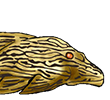Hi,
Max wrote:Sturisoma aureum 100%
I do not really disagree with the species propoesed but I do with the percentage

.
Sturisoma panamense can be certainly excluded. But as
Sturisoma species can be cross bred easily and this has been done many times alrady you cannot be 100% sure if you buy tank bred ones especially if they come from Czechia where they are produced in huge quantities.
Quite often the cross-breeding also happens without knowing as
Sturisoma species at least here in Germany are most often sold under wrong names.
At Rio Itaya (the only river around Iquitos where I have caught with sight) we found
Sturisoma only at the sand banks (not sure if it was
Sturisoma nigrirostrum or
Sturisoma guentheri) whereas we caught
Farlowella both at the sand bank and in the small branches/roots of trees.
In other rivers of that area like Rio Momon / Rio Nanay (without any sight) we caught
Farlowella both on the sand banks as well as in the emerged trees.
Both genus seem to prefer a moderate to medium strong water flow but they avoid the extremes (rapids and stagnant water).
If I compare the dentition I don't see a big difference between
Sturisoma and
Farlowella both having many straight bicuspid teeth (
Sturisoma with even more teeth which is certainly also due to the bigger mouth).
It would surprise me if this dentition is made for eating crustaceans, I think they can be considered as "Aufwuchs" feeders, I don't think that you need to give them different food.
Cheers,
Karsten










